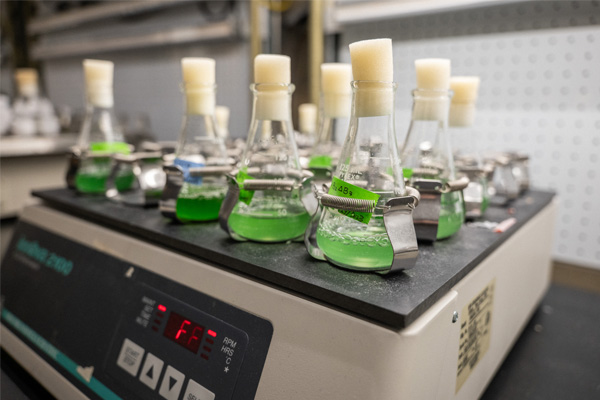Grant funds green fertilizer research at WashU
DOE awards $5 million to develop technology to convert atmospheric nitrogen into fertilizer

Washington University in St. Louis will lead one of 29 new projects under the Department of Energy’s (DOE) Energy Earthshots Initiative, which aims to advance clean energy technologies over the next decade. Biologist Himadri Pakrasi, who studies how cyanobacteria contribute to the chemistry of life, will lead a three-year $5 million effort to develop technology that can convert atmospheric nitrogen into fertilizer.
“Our project is about biological nitrogen fixation,” said Pakrasi, a George William and Irene Koechig Frieberg Professor in the Department of Biology in Arts & Sciences. “We’re taking aspects of biology, modeling and AI, and then using that knowledge to create new biological parts to be put into a photosynthetic chassis, so that these organisms can produce novel compounds and material.”
Pakrasi’s co-investigators in this project are Yinjie Tang and Yixin Chen at the McKelvey School of Engineering at Washington University, Jianping Yu and Wei Xiong at the National Renewable Energy Laboratory and Harvey Hou and Vida Dennis at Alabama State University. Their expertise ranges from synthetic biology and systems biology to machine learning and metabolic modeling.
The team will look at how cyanobacteria can convert nitrogen from the atmosphere into usable nitrogen-rich compounds, namely guanidine, ammonia and urea. All three of these compounds can be used in place of chemically synthesized fertilizers, which require massive amounts of heat and energy to produce.
The cyanobacteria also capture carbon dioxide (CO2), all while being powered by the sun, which greatly reduces the carbon footprint of the nitrogen fixation process. Pakrasi and his team are looking to develop the technology necessary for the green conversion of atmospheric nitrogen into nitrogen-dense fertilizer compounds.
Pakrasi explained that the past century has seen major advances in chemistry, but these advances have come at a large environmental cost. “What we have been doing with chemistry over the last 100 years has managed to muck up the environment in a big way. We’re looking at how biology can change that,” he said.
Pakrasi and his lab have been working on projects related to nitrogen fixation for years. Previous research about the power of cyanobacteria has been funded by the National Science Foundation and DOE, paving the way for this new effort.
This work will specifically target the Carbon Negative Shot and Industrial Heat Shot goals of the Energy Earthshots Initiative, which involve both capturing and reducing emissions. The Energy Earthshot Initiative aims to help achieve the Biden administration’s climate and clean energy goals, which include a 50% reduction in carbon emissions by 2030 and a net-zero carbon economy by 2050.
Read the full story here.





